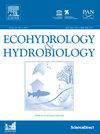Escherichia coli transport through soil columns amended with nano-zeolite and cow manure
IF 2.2
4区 环境科学与生态学
Q2 ECOLOGY
引用次数: 0
Abstract
Manure application or wastewater use as irrigation water introduces agriculture as one of the main culprits of spreading antibiotic-resistant pathogens to the environment that threatens human health. Therefore, urgent measures are needed to control the fate of antibiotic-resistant enteropathogens of agricultural origin in the environment. This study aimed to evaluate the effect of different amounts of nano-zeolite on the transport of nalidixic acid-resistant Escherichia coli strain (E. coli NAR) through disturbed soil columns amended with cow manure. Soil mixtures were prepared by adding nano-zeolite (0, 5, and 15%), with/without 5% cow manure to a loam soil. Mixtures were incubated for 60 days and then poured into polyvinyl chloride cylinders (3.6 × 15 cm) for the leaching experiment. After establishing a steady-state unsaturated flow condition, a pulse (0.1 pore volume) of E. coli NAR suspension (106 CFU mL−1) was added on top of the soil columns. The leaching experiment was followed until 5 pore volume. Nano-zeolite application increased the filtration coefficient (λf), and relative adsorption index (SR), and decreased the maximum depth (Zmax) of E. coli NAR transport in all treatments. Meanwhile, cow manure application increased E. coli NAR transport through soil columns compared to the controls. The average (Cav) and cumulative (Ccum) cell density of E. coli NAR for the columns containing 5% and 15% nano-zeolite were about 2.3 and 10-fold less than the control respectively. Therefore, the nano-zeolite application can improve soil adsorption parameters, even in manure-amended soils, and consequently reduce the risk of groundwater contamination by fecal bacteria.
大肠杆菌在经纳米沸石和牛粪改良的土壤柱中的迁移
施用粪肥或将废水用作灌溉用水,使农业成为向环境传播抗生素耐药病原体、威胁人类健康的主要罪魁祸首之一。因此,迫切需要采取措施控制环境中农业来源的耐抗生素肠病原体的命运。本研究旨在通过牛粪改性扰动土柱,研究不同用量纳米沸石对耐钠酸大肠杆菌(e.c oli NAR)转运的影响。在壤土中分别添加纳米沸石(0、5、15%)和5%牛粪,制备混合土壤。混合物孵育60 d后倒入聚氯乙烯瓶(3.6 × 15 cm)中进行浸出实验。建立稳态非饱和流动条件后,在土柱上加入0.1孔体积的大肠杆菌NAR悬浮液(106 CFU mL−1)脉冲。浸出试验持续至孔隙体积为5。施用纳米沸石提高了各处理的过滤系数(λf)和相对吸附指数(SR),降低了大肠杆菌NAR转运的最大深度(Zmax)。同时,与对照相比,施用牛粪增加了大肠杆菌通过土壤柱的NAR运输。含5%和15%纳米沸石柱的大肠杆菌NAR平均细胞密度(Cav)和累积细胞密度(Ccum)分别比对照低约2.3倍和10倍。因此,纳米沸石的应用可以改善土壤的吸附参数,甚至在粪便修正的土壤中,从而降低粪便细菌污染地下水的风险。
本文章由计算机程序翻译,如有差异,请以英文原文为准。
求助全文
约1分钟内获得全文
求助全文
来源期刊

Ecohydrology & Hydrobiology
Agricultural and Biological Sciences-Aquatic Science
CiteScore
5.40
自引率
3.80%
发文量
51
期刊介绍:
Ecohydrology & Hydrobiology is an international journal that aims to advance ecohydrology as the study of the interplay between ecological and hydrological processes from molecular to river basin scales, and to promote its implementation as an integrative management tool to harmonize societal needs with biosphere potential.
 求助内容:
求助内容: 应助结果提醒方式:
应助结果提醒方式:


